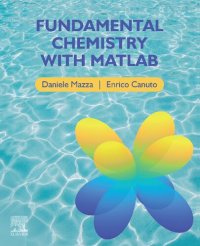
Ebook: Fundamental Chemistry with Matlab
Author: Daniele Mazza Enrico Canuto
- Genre: Chemistry
- Tags: Chemistry Computer Science Matlab algorithms
- Year: 2022
- Publisher: Elsevier
- Edition: 1
- Language: english
- pdf
Most developers today use the so called ‘ third-generation languages’ such as C, C++,
Python, and Java. A third-generation language, a general purpose language in nature, gives
the developer the kind of precise control needed to write exceptionally fast applications that
can perform a wide array of tasks. Fourth-generation languages, like Matlab (short for
Matrix Laboratory), on the contrary, are designed with a specific purpose in mind, which in
the case of Matlab, is scientific and technical computing. In this sense, it has been designed
for empowering the user to work with heterogeneous collections of data, rather than
individual variables, making it easier for the user to focus on the task, instead on the
language.
As programming languages progress through generations, they become more intelligible and
closer to human abstraction and language. Matlab took advantage since the early
developments of the abstraction levels inherent in the mathematical language and
operations, thus offering the user a mathematical environment suitable to any hardware and
operating system platform. Subsequent developments added graphical environments like
that of Simulink devoted to dynamic systems and their automatic control (to be employed in
Chapters 3 and 4), Graphical user interfaces (GUI), document editing, and a rich set of
toolboxes covering a wide spectrum of scientific and technical computing and real-time
applications in measurements and control.
The chemistry computations proposed in the book will just employ the Matlab core, without
any reference to Matlab toolboxes. To this end, we will exploits functions of the following
areas: Algebra, Linear algebra (many equations dealing with many
unknowns), Calculus, Differential equations, Optimization, Linear regression, Statistics,
Curve fitting, Graphing.
Code listing in this book is specifically designed to work on Matlab platform, however with
a little efforts most of the simple scripts can be exported to Octave, a very similar but free
platform. Indeed if you are looking for an open-source environment close to Matlab in terms
of compatibility and computational ability, then Octave is the best alternative. It runs on
any operating system without any modifications. Scilab is another open-source option for
numerical computing which runs across all the major platforms. Like Octave it is very
similar to Matlab in its implementation, although exact compatibility is not a goal of the
project developers. It has the advantage of possessing a graphical interface similar to
Simulink, named Xcos.
Python, and Java. A third-generation language, a general purpose language in nature, gives
the developer the kind of precise control needed to write exceptionally fast applications that
can perform a wide array of tasks. Fourth-generation languages, like Matlab (short for
Matrix Laboratory), on the contrary, are designed with a specific purpose in mind, which in
the case of Matlab, is scientific and technical computing. In this sense, it has been designed
for empowering the user to work with heterogeneous collections of data, rather than
individual variables, making it easier for the user to focus on the task, instead on the
language.
As programming languages progress through generations, they become more intelligible and
closer to human abstraction and language. Matlab took advantage since the early
developments of the abstraction levels inherent in the mathematical language and
operations, thus offering the user a mathematical environment suitable to any hardware and
operating system platform. Subsequent developments added graphical environments like
that of Simulink devoted to dynamic systems and their automatic control (to be employed in
Chapters 3 and 4), Graphical user interfaces (GUI), document editing, and a rich set of
toolboxes covering a wide spectrum of scientific and technical computing and real-time
applications in measurements and control.
The chemistry computations proposed in the book will just employ the Matlab core, without
any reference to Matlab toolboxes. To this end, we will exploits functions of the following
areas: Algebra, Linear algebra (many equations dealing with many
unknowns), Calculus, Differential equations, Optimization, Linear regression, Statistics,
Curve fitting, Graphing.
Code listing in this book is specifically designed to work on Matlab platform, however with
a little efforts most of the simple scripts can be exported to Octave, a very similar but free
platform. Indeed if you are looking for an open-source environment close to Matlab in terms
of compatibility and computational ability, then Octave is the best alternative. It runs on
any operating system without any modifications. Scilab is another open-source option for
numerical computing which runs across all the major platforms. Like Octave it is very
similar to Matlab in its implementation, although exact compatibility is not a goal of the
project developers. It has the advantage of possessing a graphical interface similar to
Simulink, named Xcos.
Download the book Fundamental Chemistry with Matlab for free or read online
Continue reading on any device:

Last viewed books
Related books
{related-news}
Comments (0)